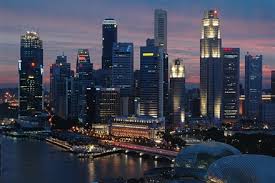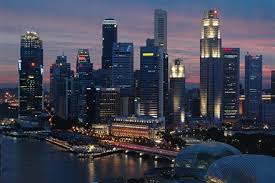
While one dark cloud over the luxury end has disappeared, analysts say that all the obstacles facing Singapore’s property market might not be cleared.
According to Brandon Lee, a property analyst at JPMorgan in Singapore, compared with similar luxury properties in other major capital cities, Singapore's extremely high-end properties are now heap.
Lee said that Singapore's properties now represent a good deal for ultra-high-net-worth investors who were comparison shopping between capitals, after a 15-25 percent drop in prime and luxury residential prices since the market peak in 2011. Lee noted that at prices as much as 165 percent higher than in Singapore, luxury housing in London, Hong Kong and New York was expensive.
Lee said that private equity and global property funds keen to buy multiple apartments from developers in "block" deals were getting interested by that "very attractive" gap. He noted that buyers and rich individuals were also getting interested in making purchases of family offices.
While waiting for buyers to return to the market, Singapore's government does not allow developers to sit on unsold units and this is a big motivation for developers despite often needing to offer additional discounts to do those bulk deals. An "extension charge" of 8 percent of the proportional land cost for the first year, rising to 16 percent in the second year and 24 percent in the third is face by any units unsold two years after a project's completion.
The recovery in Singapore's ultra-high-end property was overdue, said some experts.
"Values in the market are a joke in comparison to some markets," such as London, Hong Kong and Monaco, said property investor Alexander Karolik Shlaen, an economist and CEO of Panache Management, a luxury brands and investment adviser said that "Values in the market are a joke in comparison to some markets," such as London, Hong Kong and Monaco.
In London, the $2,000 a square foot running price of Singapore's freehold luxury property, wouldn't be considered a luxury price, he noted.
Purchasers who weren't subject to Singapore's Additional Buyer's Stamp Duty (ABSD) rule would also be motivated to buy, expects Shlaen.
ABSD adds much as an additional 15 percent to the purchase price for foreign buyers and Singaporeans with more than one property and this regulation was started from 2011 by Singapore's government in a bid to rein in its housing market's sharp price rises.
It appears to have successfully dampened interest in luxury properties in the city-state even as the additional cost may not seem terribly onerous for buyers at the high end.
Buyers from some countries, including the U.S., Switzerland and Lichtenstein, are exempt due to tax treaties.
Americans became the second-most frequent buyers of high-end Singapore homes in the second quarter, JPMorgan's Lee noted that in an unusual development. Lee said that the list is usually dominated by individuals from Malaysia, Indonesia and China.
"It could reflect that prices have fallen enough to look at the space," Lee said.
He however cautioned that the mainstream housing market still had room to drop and that he only saw Singapore's high-end as having bottomed out.
"If you look at unsold inventory, it's at a record low" for the high end, Lee said.
(Source:www.cnbc.com)
According to Brandon Lee, a property analyst at JPMorgan in Singapore, compared with similar luxury properties in other major capital cities, Singapore's extremely high-end properties are now heap.
Lee said that Singapore's properties now represent a good deal for ultra-high-net-worth investors who were comparison shopping between capitals, after a 15-25 percent drop in prime and luxury residential prices since the market peak in 2011. Lee noted that at prices as much as 165 percent higher than in Singapore, luxury housing in London, Hong Kong and New York was expensive.
Lee said that private equity and global property funds keen to buy multiple apartments from developers in "block" deals were getting interested by that "very attractive" gap. He noted that buyers and rich individuals were also getting interested in making purchases of family offices.
While waiting for buyers to return to the market, Singapore's government does not allow developers to sit on unsold units and this is a big motivation for developers despite often needing to offer additional discounts to do those bulk deals. An "extension charge" of 8 percent of the proportional land cost for the first year, rising to 16 percent in the second year and 24 percent in the third is face by any units unsold two years after a project's completion.
The recovery in Singapore's ultra-high-end property was overdue, said some experts.
"Values in the market are a joke in comparison to some markets," such as London, Hong Kong and Monaco, said property investor Alexander Karolik Shlaen, an economist and CEO of Panache Management, a luxury brands and investment adviser said that "Values in the market are a joke in comparison to some markets," such as London, Hong Kong and Monaco.
In London, the $2,000 a square foot running price of Singapore's freehold luxury property, wouldn't be considered a luxury price, he noted.
Purchasers who weren't subject to Singapore's Additional Buyer's Stamp Duty (ABSD) rule would also be motivated to buy, expects Shlaen.
ABSD adds much as an additional 15 percent to the purchase price for foreign buyers and Singaporeans with more than one property and this regulation was started from 2011 by Singapore's government in a bid to rein in its housing market's sharp price rises.
It appears to have successfully dampened interest in luxury properties in the city-state even as the additional cost may not seem terribly onerous for buyers at the high end.
Buyers from some countries, including the U.S., Switzerland and Lichtenstein, are exempt due to tax treaties.
Americans became the second-most frequent buyers of high-end Singapore homes in the second quarter, JPMorgan's Lee noted that in an unusual development. Lee said that the list is usually dominated by individuals from Malaysia, Indonesia and China.
"It could reflect that prices have fallen enough to look at the space," Lee said.
He however cautioned that the mainstream housing market still had room to drop and that he only saw Singapore's high-end as having bottomed out.
"If you look at unsold inventory, it's at a record low" for the high end, Lee said.
(Source:www.cnbc.com)














